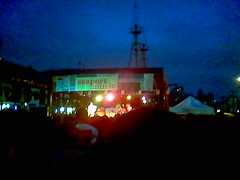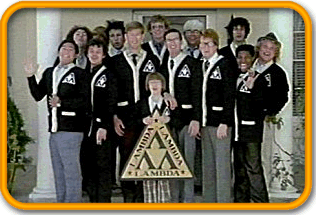
So, top left-leaning German author
Gunther Grass has confessed to a youthful indiscretion. It's not a normal youthful indiscretion, like writing bad poetry or trying marijuana. No, Grass, currently pimping a volume of memoirs,
let slip that he was a member of the Waffen SS during the dying days of World War II.
My knowledge of the man's work consists of an hour spent leafing through the first chapter of the
Tin Drum as a bored teenager during
prep. Indeed, I once managed to insult the good denizens of
Calw by confusing Grass with their noted son
Hermann Hesse, who was of anything even more of a hippy.
So I'll spare you too much of the analysis of his work, and do what I do best - impugn the motives of those that commented on the revelation. The comments are basically variants of that popular flavour Schadenfreude and Ass. And few of them focus on the fact that Grass was drafted into the SS unit and never fired a shot in anger, or that while he never fessed up, most descriptions of his wartime activities say that "it was assumed that" rather than "he asserted that".
The most entertaining commentator is
Christopher Hitchens, although his article on the subject is nowhere nears as intemperate as the headline ("Günter Grass is a bigmouth, a huckster, and a hypocrite") suggests. Hitch is loath to utterly put the boot in, knowing that morally pure sh*tkicking writers are in even more scant supply than their morally impure counterparts (right, Mr. Hitchens?). He hews awkwardly to the conventional wisdom, which is that Grass' writing is not what it used to be.
Still yelling at Hitchens for yelling at Grass for persisting as a caveman leftist is not too fruitful. And I hope almost sincerely that those that are attacking him now are treating the exposure as payback for his most recent anti-American outbursts. Because if they thought that asking Germany to confront its Nazi past made him a sanctimonious bastard, then might this not suggest that they are a gang of unreformed,
ODESSA-shagging
Dentists From Brazil?
Still, to step back from the name-calling and seventies movie references a moment, what's been so interesting about the US reaction is how little credit it gives to the German habit of self-examination (I'm talking about the Germans' habit of turning a flashlight onto their culture and identity in this instance rather than their turning a flashlight on their
bowel movements).
I get the impression that merely to call for more rigorous confrontation with a country's past is somehow creepy. And I'll go out on a limb and suggest that the difference between Germans and Americans is that while both care about whether other nationalities like them (unlike, say, the British, or
Millwall on sea), the Germans are interested in the details of the answer. If you think that I'm engaging in crass simplifications here, spare a moment to consider the career of one
Karen Hughes.
It might explain a little the difference between the European desire to understand how the holocaust happened and the urge simply to say that it was very bad and to urge us never to forget, US historians being prominent amongst the ranks of the latter. Now, it is important not to minimise the import, scale and depravity of what the Nazis did to the Jews, and its important to say this, in small part so that people will keep reading your argument.
I was struck by this when finishing Stephen Ozment's
A Mighty Fortress. Ozment's book attracted quite a few brickbats, many of them for some inaccuracies in his retelling the Great War, and some others for his book being a little short. It's certainly clear that the guy's most comfortable discussing the sixteenth century and Reformation, and I think that his attempt to show that the duality between individualism and communalism (Bad -isms? Probably both of them) has been a constant is worthwhile.
Ozment spends a fair while on this duality, exploring the image German generals during the Roman empire, both high officials and barbarians in Roman eyes, and looking at the traumas that Germany experienced during the Thirty Years was and Napoleonic era. Germans tended to be rather paranoid about the threat from internal and external enemies, and Hitler exploited it cleverly.
You can imagine that for all this, Ozment's treatment of the WWII era is much too light on discussion of the holocaust. Ozment does say the book is an attempt to see whether viewing the holocaust as the end point of German historiography is a worthwhile exercise, or whether it was just the most grotesque result (of several) of German contradictions. I must say I was worried that there was too much explaining of German anti-Semitism, and too little defining of it, but the conclusion is a little more reassuring, and drops the name of Grass repeatedly, and since Ozment has a better feel for the inner mind of a sixteenth century burgher than the German High Command he probably should get a pass.
Which is why I found the debate in Alan Bennett's
History Boys (a play I caught recently) rather interesting. There are multiple themes at work, and the play's depiction of Oxbridge exams and History was frighteningly similar to my own experience - my avoidance of molestation and attendance at a fee-paying school notwithstanding.
But to describe a conflict between a glib and needlessly flash modern-style teacher and the more traditional and morally-compassed methods of the old-school pervert teacher is at times artificial. To say that the Holocaust cannot be put into context is one thing, to say that it should not be explained is another. More likely Bennett was simply saying that one shouldn't play around with the facts of an atrocity just to stimulate a jaded Oxford entrance professor. But to question popular asssumptions, this glib and morally unmoored writer would suggest, is not always bad, provided it is done with the requisite sensitivity.
Oy. Looks like I've taken a perfectly erudite and sprawling post and tacked a truism on the end. That's what studying Germans will do for you, though. There's one topical bit of music for today, mind. By a band whose lead singer had the same last name as Gunther Grass' city of birth...(Wasn't your mp3blogging licence revoked some weeks ago? - Ed)
The Misfits - "Halloween""Get Yer Legacy Of Brutality" here. This blog disclaims all responsibility for you turning into a bluddy goth



















